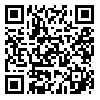BibTeX | RIS | EndNote | Medlars | ProCite | Reference Manager | RefWorks
Send citation to:
URL: http://jdisabilstud.org/article-1-2798-en.html
2- Professor, Department of Psychology, Ardabil Branch, Islamic Azad University, Ardabil, Iran;Department of Psychology, University of Tabriz, Tabriz, Iran
3- Assistant Professor, Department of Psychology, Ardabil Branch, Islamic Azad University, Ardabil, Iran
Abstract
Background & Objective: Promoting couple intimacy by teaching life skills is one way couples can use to manage their feelings, thoughts, and behaviors. Life skills increase couples' adaptation to the environment and its challenges, enabling them to deal effectively with family, work, and environmental issues. Life skills training helps people turn their knowledge, values, attitudes, and skills into practical tools. According to previous research, there are several psychological interventions for marital intimacy. This study was conducted to determine the effectiveness of life skills training on married women's marital intimacy subscales.
Methods: This research is applied in terms of purpose and causal-analytical in terms of data collection and processing. Also, the research method is quasi-experimental with a pretest-posttest design and a control group. The statistical population includes married women referred to counseling centers in Marand City, Iran, due to marital problems. Among the clients, 30 women with poor marital satisfaction based on implementing Bagarozzi's Marital Intimacy Needs Questionnaire (conducted by the facilitator) were selected by the available sampling method and randomly placed in two groups. The samples were also evaluated with study questionnaires and related tools at the pretest and posttest stages. After selecting the samples and assigning them to the experimental and control groups, Bagarozzi's Marital Intimacy Needs Questionnaire was implemented on both groups as the pretest. Then, life skills training based on the relevant protocol only was held for the experimental group (in 8 60-minute sessions once a week). After completing the intervention, Bagarozzi's Marital Intimacy Needs Questionnaire ( 41-question form) was administered as a posttest in accordance with health protocols in two groups. It should be noted that life skills training was not performed in the control group. The obtained data were analyzed using multivariate analysis of covariance.
Results: The results of covariance analyses in the posttest showed that training life skills significantly increased the mean subscale components of marital intimacy, including emotional intimacy (p=0.024), psychological intimacy (p=0.045), intellectual intimacy (p=0.015), physical intimacy (p=0.048), aesthetic intimacy (p=0.050), and social intimacy (p=0.045) in married women in the experimental group compared to the control group. Also, there is a significant difference between the experimental and control groups in the posttest with regard to the total marital intimacy index (p=0.009).
Conclusion: Based on the findings of this study, life skills training is effective in the marital intimacy of married women. Therefore, it can be concluded that a life skills training program can be used as a suitable program to increase couples' marital satisfaction.
| Rights and permissions | |
 |
This work is licensed under a Creative Commons Attribution-NonCommercial 4.0 International License. |




